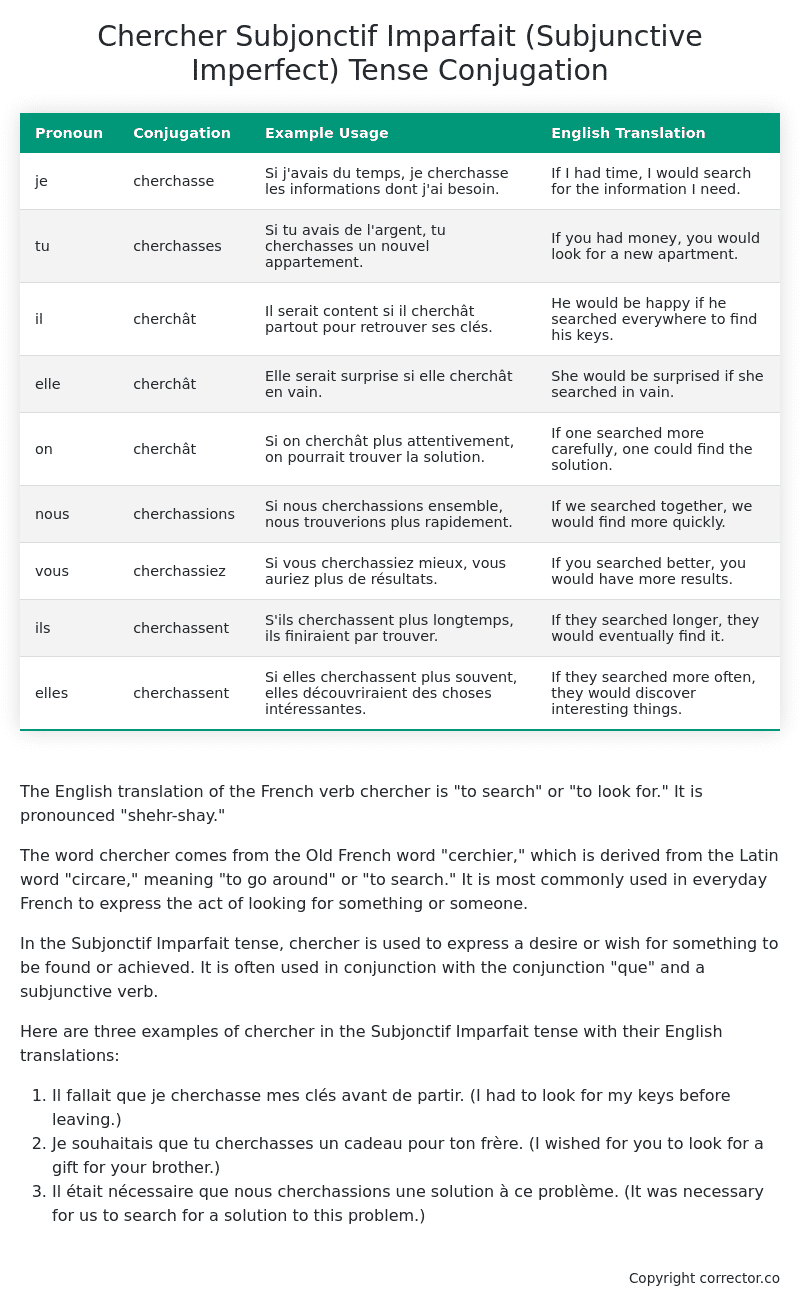Subjonctif Imparfait (Subjunctive Imperfect) Tense Conjugation of the French Verb chercher
Introduction to the verb chercher
The English translation of the French verb chercher is “to search” or “to look for.” It is pronounced “shehr-shay.”
The word chercher comes from the Old French word “cerchier,” which is derived from the Latin word “circare,” meaning “to go around” or “to search.” It is most commonly used in everyday French to express the act of looking for something or someone.
In the Subjonctif Imparfait tense, chercher is used to express a desire or wish for something to be found or achieved. It is often used in conjunction with the conjunction “que” and a subjunctive verb.
Here are three examples of chercher in the Subjonctif Imparfait tense with their English translations:
- Il fallait que je cherchasse mes clés avant de partir. (I had to look for my keys before leaving.)
- Je souhaitais que tu cherchasses un cadeau pour ton frère. (I wished for you to look for a gift for your brother.)
- Il était nécessaire que nous cherchassions une solution à ce problème. (It was necessary for us to search for a solution to this problem.)
Table of the Subjonctif Imparfait (Subjunctive Imperfect) Tense Conjugation of chercher
| Pronoun | Conjugation | Example Usage | English Translation |
|---|---|---|---|
| je | cherchasse | Si j’avais du temps, je cherchasse les informations dont j’ai besoin. | If I had time, I would search for the information I need. |
| tu | cherchasses | Si tu avais de l’argent, tu cherchasses un nouvel appartement. | If you had money, you would look for a new apartment. |
| il | cherchât | Il serait content si il cherchât partout pour retrouver ses clés. | He would be happy if he searched everywhere to find his keys. |
| elle | cherchât | Elle serait surprise si elle cherchât en vain. | She would be surprised if she searched in vain. |
| on | cherchât | Si on cherchât plus attentivement, on pourrait trouver la solution. | If one searched more carefully, one could find the solution. |
| nous | cherchassions | Si nous cherchassions ensemble, nous trouverions plus rapidement. | If we searched together, we would find more quickly. |
| vous | cherchassiez | Si vous cherchassiez mieux, vous auriez plus de résultats. | If you searched better, you would have more results. |
| ils | cherchassent | S’ils cherchassent plus longtemps, ils finiraient par trouver. | If they searched longer, they would eventually find it. |
| elles | cherchassent | Si elles cherchassent plus souvent, elles découvriraient des choses intéressantes. | If they searched more often, they would discover interesting things. |
Other Conjugations for Chercher.
Le Present (Present Tense) Conjugation of the French Verb chercher
Imparfait (Imperfect) Tense Conjugation of the French Verb chercher
Passé Simple (Simple Past) Tense Conjugation of the French Verb chercher
Passé Composé (Present Perfect) Tense Conjugation of the French Verb chercher
Futur Simple (Simple Future) Tense Conjugation of the French Verb chercher
Futur Proche (Near Future) Tense Conjugation of the French Verb chercher
Plus-que-parfait (Pluperfect) Tense Conjugation of the French Verb chercher
Passé Antérieur (Past Anterior) Tense Conjugation of the French Verb chercher
Futur Antérieur (Future Anterior) Tense Conjugation of the French Verb chercher
Subjonctif Présent (Subjunctive Present) Tense Conjugation of the French Verb chercher
Subjonctif Passé (Subjunctive Past) Tense Conjugation of the French Verb chercher
Subjonctif Imparfait (Subjunctive Imperfect) Tense Conjugation of the French Verb chercher (this article)
Subjonctif Plus-que-parfait (Subjunctive Pluperfect) Tense Conjugation of the French Verb chercher
Conditionnel Présent (Conditional Present) Tense Conjugation of the French Verb chercher
Conditionnel Passé (Conditional Past) Tense Conjugation of the French Verb chercher
L’impératif Présent (Imperative Present) Tense Conjugation of the French Verb chercher
L’infinitif Présent (Infinitive Present) Tense Conjugation of the French Verb chercher
Struggling with French verbs or the language in general? Why not use our free French Grammar Checker – no registration required!
Get a FREE Download Study Sheet of this Conjugation 🔥
Simply right click the image below, click “save image” and get your free reference for the chercher Subjonctif Imparfait tense conjugation!

Chercher – About the French Subjonctif Imparfait (Subjunctive Imperfect) Tense
Formation
Common Everyday Usage Patterns
Interactions with Other Tenses
Subjonctif Présent
Indicatif Passé Composé
Conditional
Conditional Perfect
Summary
I hope you enjoyed this article on the verb chercher. Still in a learning mood? Check out another TOTALLY random French verb conjugation!


